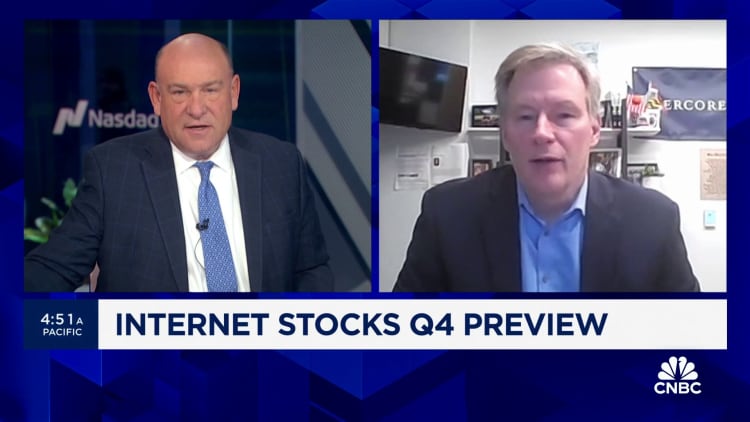Facebook founder and CEO Mark Zuckerberg meets Founder and Executive Chairman of Alibaba Group Jack Ma (not pictured), at the China Development Forum in Beijing, China, March 19, 2016.
Shu Zhang | Reuters
Like many Facebook and Instagram users, marketing veteran Victor Lee is inundated with ads from Chinese online retailer Temu when he opens one of his Meta apps.
Recently, he saw a promotion on his Instagram feed for a generic golf bag. Lee, a newbie golfer who’s been shopping for equipment, was intrigued enough to click on the ad. He then landed on Temu’s storefront.
“They know I’m a golf enthusiast,” said Lee, a former senior executive at toy giant Hasbro who is now president of digital advertising firm Advantage United Commerce. “They look on my Instagram, they see I follow a lot of golf players and golf shoes and stuff. You don’t need a lot of tracking mechanisms to know this person likes golf.”
Lee ended up skipping out on the purchase because it wasn’t what he wanted. But his experience is increasingly one that’s shared across Facebook’s massive userbase. Temu and rival Shein are spraying ads across Facebook and Instagram as they try to build their brands and snag consumers from Amazon and Alibaba’s AliExpress. Temu is owned by PDD Holdings, a Chinese company that moved its principal office to Ireland last year. Shein was founded in China and relocated its headquarters to Singapore in 2022.
In reaching U.S. consumers, both companies are taking advantage of lower production costs in China while benefiting from trade rules that exempt them from paying import tariffs on shipments that don’t exceed $800, U.S. lawmakers have claimed.
Lee, who analyzes the digital ad industry even when it doesn’t overlap with his golf pursuits, said using Facebook to pay for downloads is a familiar strategy. Mobile gaming companies have spent big bucks to generate downloads, while discount online retailer Wish and viral video app TikTok have at times flooded users’ feeds with promotions.
“Once they get that download, that’s it,” Lee said. “They’re less reliant on the download, and more reliant on upselling the people that have the app. That’s not a new strategy. They’re just so big and they’re spending so much that you’re noticing this strategy.”
One big difference now is that Temu and Shein are having an outsized impact on Meta’s financials and presenting a potentially distorted picture about the company’s growth rate. As Meta prepares to update Wall Street on Thursday with its fourth-quarter earnings reports, analysts and investors are trying to gauge how much of an impact two online retailers from the China region are having on the company’s top line, and the sustainability of that growth given the limited track record of those clients.
Meta is expected to report revenue growth of 22% for the quarter to $39.2 billion, according to analysts surveyed by LSEG, formerly Refinitiv.
A Meta spokesperson declined to comment for this story.
UKRAINE – 2023/03/11: In this photo illustration, Temu, LLC logo seen on a smartphone and on a pc screen. (Photo Illustration by Pavlo Gonchar/SOPA Images/LightRocket via Getty Images)
Sopa Images | Lightrocket | Getty Images
Rise of the Chinese retailers
Temu launched in 2022, while Shein, which was founded in 2012, didn’t start aggressively advertising on social media until the last couple years.
Meta finance chief Susan Li said on the last earnings call in October that the company has “benefited from spend among advertisers in China reaching customers in other markets,” echoing comments she made in April. Although Meta didn’t name Temu and Shein by name, analysts widely speculated that they were most responsible for the sales lift, considering their explosive growth of late.
JMP analysts estimated that Temu and Shein spent roughly $600 million and $200 million, respectively, on Facebook and Instagram ads in the third quarter. That would suggest they accounted for about 3% of Meta’s total growth in the period, according to JMP.
Research from data.AI prepared for CNBC shows that Temu notched 73.87 million downloads in 2023, up over 500% from a year prior. Shein’s downloads increased around 52% over that stretch to 36.93 million.
Heading into Thursday’s earnings report, Meta is on a tear. The stock hit a record last week and has continued to rally. It’s now up 12% this year after almost tripling in 2023.
That followed a miserable 2022, when Meta lost almost two-thirds of its value. The company suffered from soaring inflation, rising interest rates and a broad rotation out of tech stocks. It also was reeling from Apple’s iOS privacy change in late 2021 that made it much harder for brands to target users.

Meta bulls recognize the benefit of fresh spending coming from Chinese retailers but say the company doesn’t rely on it.
Chris Mack, a portfolio manager at Harding Loevner, said the rise of Temu and Shein illustrate “the power of Facebook as a platform for reach.” However, he said the company’s hefty cost-cutting initiatives (20,000 job cuts last year), investments in artificial intelligence and more disciplined operations are driving the story on Wall Street. The company has also had two years to adjust to Apple’s changes and develop new ad technologies, helped by AI.
“China has been a sort of a cherry on top of what they’ve been able to do — it just gives that extra tailwind,” said Mack, whose firm owns over $500 million in Meta shares, according to FactSet. “This business works regardless of what happens there.”
Still, every point of growth counts for a company that suffered from three straight quarters of declining revenue in 2022 and is expected to show expansion in the low teens for 2024 far below historic standards.
‘Mafia-style intimidation’
From that vantagepoint, Temu and Shein represent potential risks.
One issue is the legal battle between the two. In December, Temu sued Shein, alleging questionable business practices and a “mafia-style intimidation of suppliers,” according to legal documents.
That was a month after Shein confidentially filed to go public, with an expected debut in the U.S. sometime in 2024. But China’s powerful internet regulator, the Cyberspace Administration of China, recently engaged in a security review of Shein’s supply chain presence in the country, a person familiar with the matter told CNBC. The review focuses on how Shein handles information about its employees, partners and suppliers in the region, The Wall Street Journal reported.
Then there’s the import rule, which Representative Mike Gallagher (R-WI) called a “loophole that is being abused to tilt the playing field against American companies.” Gallagher, who chairs the select committee on China, said in a statement in June that Temu and Shein are “dodging import taxes and evading scrutiny on the millions of goods they sell to Americans.”
In its 2022 annual report, published before the Temu and Shein spending boom really took off, Meta said it generates “meaningful revenue from a limited number of resellers serving advertisers based in China.” The company said revenue could be hurt from action taken by the Chinese government due to issues including “the trade dispute with the United States” and other potential penalties.
Brian Wieser, principal at consulting firm Madison and Wall, said that in highlighting Chinese retailers during its earnings calls, Meta is telling investors “it’s a big risk factor to at least be aware of.”
A Shein spokesperson told CNBC in an email that ad spending was ongoing and that the company “continues to execute a variety of marketing activities globally, including online/mobile marketing such as in-app and email as well as out-of-home advertising.”
A Temu representative didn’t respond to requests for comment.
In a December analysis of Meta’s China-U.S. cross-border ad revenue, Wieser estimated that more than $7 billion in sales last year came from China. The only number Meta provides is for the Asia-Pacific region, which accounted for $6.9 billion in third-quarter revenue, or about 20% of the total.
Meta isn’t the only U.S. internet company effected by the speedy growth from Temu and Shein.
“There’s no question that Temu and Shein are having an impact in the market,” Etsy CEO Josh Silverman told analysts on his company’s third-quarter earnings call. “You don’t get that big that fast without taking share from many people, and I think we and most players in e-commerce have had some impact.”
Silverman added that Etsy has to pay more for digital ads because “those two players are almost single-handedly having an impact on the cost of advertising, particularly in some paid channels in Google and in Meta.”
Money to spend
Additionally, Amazon has been courting Chinese companies to use its platform and to fend off competition from Temu and Shein. Chinese sellers are buying accompanying ads, helping bolster Amazon’s ballooning advertising business, said Juozas Kaziukenas, CEO of e-commerce intelligence firm Marketplace Pulse.
“It’s really misunderstood and underappreciated how much of the advertising industry directly depends on China,” he said.
Rishi Shiva, co-founder of growth marketing firm Pinebone, said Temu and Shein are willing to spend in ways that other brands are not. The iOS privacy update made it more expensive to run effective campaigns, which has led many companies to curb their Facebook spending in the last couple years, Shiva said.
“In the Wish era, anyone who had an app was spending money on Facebook,” Shiva said. “Any company that launched an app was on Facebook, trying to get as many users as possible.”
For now, Temu and Shein have the money and their wallets are open. Analysts have estimated that Shein’s annual sales are significantly over $30 billion, while Temu likely surpassed $16 billion in 2023 revenue. In Mack’s view, there’s no better place for them to advertise than Facebook.
“Whether it’s TikTok, whether it’s mobile games, whether it’s ecommerce ads, Facebook is the way that gives you the broadest reach,” he said.
WATCH: Evercore ISI’s Mark Mahaney on why Google is the riskiest large-cap Internet stock

Read More: World News | Entertainment News | Celeb News
CNBC










